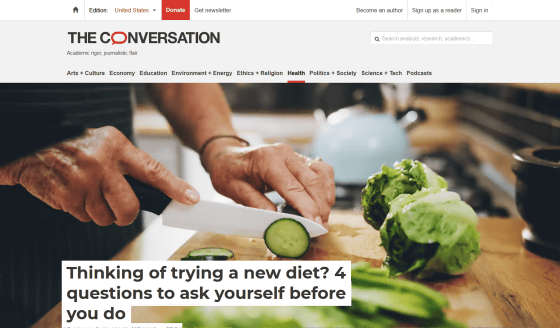What are the '4 questions' you should ask yourself before going on a diet?

In today's society where a slim figure is highly valued, messages and advice on dieting and weight loss are frequently trending on social media, and it has been reported that
Thinking of trying a new diet? 4 questions to ask yourself before you do
https://theconversation.com/thinking-of-trying-a-new-diet-4-questions-to-ask-yourself-before-you-do-237766

◆1: Is the diet realistic?
Diets involve dietary and lifestyle changes, so you need to consider the financial costs, time, and resources required to maintain them before you start. For example, if someone tells you that you should buy a certain supplement or dieting device to lose weight, you should be careful because they may be trying to use the diet for their own gain.
In addition, many extreme diets are promoted by 'privileged people' and tend to overlook factors such as 'affordable access to a wide variety of foods,' 'cooking skills,' 'where you live,' and 'cultural and ethical differences,' so not everyone can necessarily follow the same diet.
If a diet has these problems, people who fail to follow it may feel frustration, stress, stigma, and failure. However, the problem is not with the people who fail to follow the diet, but with the diet itself, Eaton and his colleagues say.

◆2: Is there evidence to support the effectiveness and safety of this diet?
On the internet, self-proclaimed experts often offer diet and health advice aimed at specific target groups, such as 'men aged 30-50 with diabetes.' Sometimes the advice is based on animal studies, which may not be replicated in humans. So when taking on diet advice, it's important to check whether the claims are based on research that really fits your profile.
'To prove that a diet is effective and safe, we need many high-quality studies over time, not just one study. Ask yourself, 'Is the claim supported by multiple human studies?' Be critical and question claims before accepting them,' Eaton and his colleagues said. They advised people to check government websites or ask their doctor if they want accurate information.

◆3: How do dietary restrictions affect my life?
Many people start by restricting their food intake when they decide to go on a diet, but food plays many roles in our lives, not just as a way to take in calories and nutrients. Food is important for connecting with others and socializing, it's a source of pleasure and comfort, and a way of learning about the world, so restricting your food intake can unwittingly disrupt the social and cultural roles that food plays.
So when considering a new dietary restriction, ask yourself, 'How will it affect me at a time that is important to me?' For example, if your dietary restriction means you can't eat local cuisine when choosing where to eat while traveling, or if you have to miss dinner at a restaurant a friend chose because it doesn't fit your dietary restrictions, then your dietary restriction may be too much of a drag on the joys of life.

◆4: Does restricting your diet make you feel guilty or affect your mental health?
'What are your favorite foods? Does the diet 'allow' you to eat them? Imagine visiting your mother, who prepared all your favorite childhood foods for you. How does the diet make you feel about these foods? Do you feel stressed or guilty about enjoying birthday cake or a meal cooked by a loved one?' they say, pointing out that trying too hard to stick to dietary restrictions can have a negative impact on mental health.
Research has shown that dieting can have a negative impact on people's mental health, and skipping meals can worsen symptoms of depression and anxiety . Eaton and his colleagues say, 'Many diets don't take into account the psychological aspects of eating, even though mental health is just as important as physical health. Eating shouldn't make you feel stressed, anxious, or guilty. So before you start a diet, think about how it will affect your mental health.'

Related Posts:







